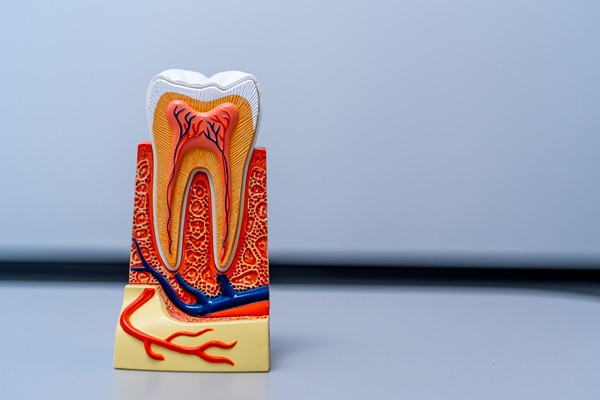You May Need a Root Canal for a Chipped Tooth

Even though many people associate the need for a root canal with tooth decay, a variety of conditions can lead a dentist to recommend one. In some cases, dental issues such as a chipped tooth cannot be ignored or fixed easily through cosmetic-type procedures. How do you know when your chipped tooth needs to be fixed by a root canal instead of other procedures?
Methods of fixing chipped teeth
Fillings and dental bonding
In the case of a small breakage, the simple procedure of a dental filling or bonding could be warranted. Especially true in cases when the chip does not cause pain and has not breached the tooth beyond the enamel, a filling or bonding can be quickly and easily completed in a dentist’s office, often without anesthesia. A chipped tooth that affects an individual's smile can be bonded with tooth-colored material and smoothed seamlessly over the intact part of the tooth.
Crowns
A cap or crown can be a solution for a chipped tooth if the chip has caused a crack that expands beyond the tooth enamel. Metal, porcelain, resin or ceramic crowns could be an option, depending upon how much of the tooth is left intact and what condition the remainder of the tooth is in. Often, crowns can be used when the chip or break is caused as part of larger decay of the tooth. The decay is first removed in a similar way as preparation for a filling, but a cap will be placed instead of a filling. Crowns can be performed with or without a root canal procedure, and the extent of the procedure depends on the damage to the tooth.
Veneers
If the cracked or chipped tooth is in an easily viewable area and a dental bonding is not possible, some individuals choose to have a veneer placed instead. For a veneer, the tooth is prepared by removing more of the enamel to roughen up the surface. The veneer is created specifically for that tooth to mimic the look of the other teeth and the tooth it is replacing. Specialized cement bonds the veneer to the remainder of the tooth.
Root canal
In the case of a tooth that has been cracked beyond the enamel into the root or has been chipped in a way that exposes the pulp of the tooth below, a root canal procedure might be the best solution. Exposure of the pulp of the tooth can lead to infection, so it is important in these cases for any dead or damaged pulp to be removed before a crown or other visual repair device can be placed. It can sometimes be difficult to determine whether or not the pulp is damaged, but there are a few warning signs that indicate the crack or chip goes beyond the enamel:
- Tooth pain
- Sensitivity to temperature, especially heat
- Marked tooth discoloration
Conclusion
Although several options exist for cracked or chipped teeth, some circumstances require more extensive repair than your average bonding or filling. If your tooth has experienced a chip that extends beyond the enamel into the pulp of your tooth, it is important to get an evaluation to see if a root canal needs to be performed to avoid infection and further damage.
Request an appointment here: https://santarosaendodontics.com or call Santa Rosa Endodontics at (707) 706-2143 for an appointment in our Santa Rosa office.
Check out what others are saying about our services on Yelp: Read our Yelp reviews.
Recent Posts
A non-surgical root canal is an endodontic procedure known for preserving a tooth affected by severe decay, infection, or trauma, all without incisions in the gum tissue. Many patients become anxious when they hear the term "root canal," yet modern techniques can provide a gentler experience than expected. Endodontists often recommend this treatment when a…
A general dentist can perform basic tasks in tooth care, such as X-rays, oral examinations, filling cavities, and extractions. However, patients may be referred to an endodontist for more complex work, such as certain root canals. When is it likely for a dentist to refer a patient to this dental specialist?While a filling can fix…
Root canal treatment is often the first line of defense for treating teeth with compromised pulp chambers. The pulp chamber is the innermost layer of a tooth, and it stores nerves, blood vessels, and connective tissues. The chamber is sealed off from the rest of the tooth to protect it against bacteria and other irritants…
A root canal can preserve and strengthen a severely damaged or infected tooth. When seeing a root canal dentist, asking informed questions can provide clarity, ease concerns, and improve treatment outcomes. Understanding the procedure helps make the experience more comfortable and ensures you are well-prepared for each step.While each patient's situation is unique, the following…


